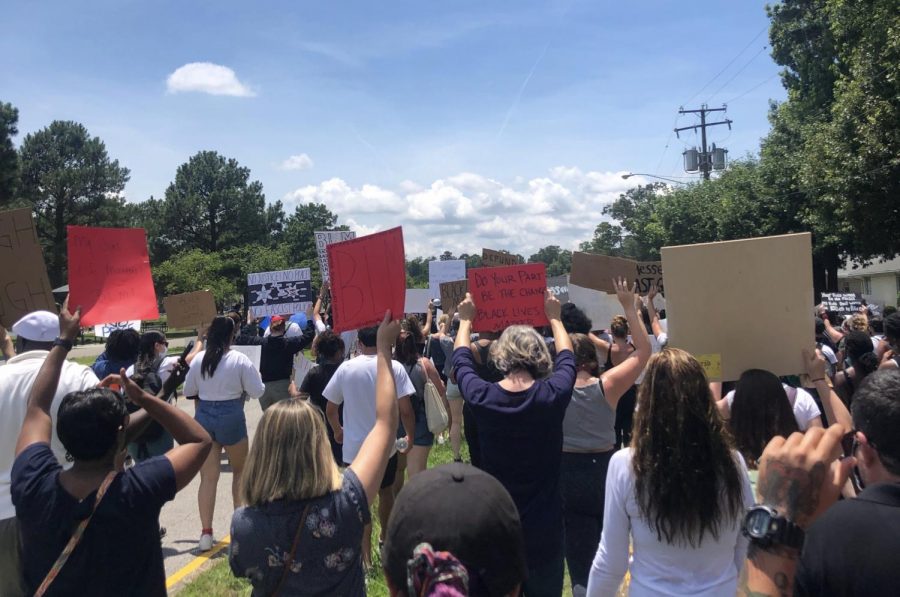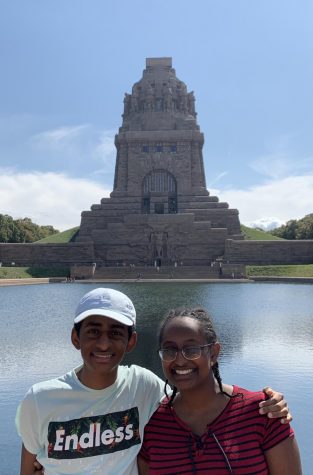Let’s talk about systemic racism
A crowd marches through Virginia Beach on June 6 in protest of police brutality.
June 16, 2020
“No justice, no peace!”
Copious social media postings. Constant media coverage. Ubiquitous protests and demonstrations. Over the past few weeks, the Black Lives Matter movement has exploded across America, with protests in all 50 states.
The protests began in response to the murder of George Floyd, a black man in police custody in Minneapolis. The issue of police brutality against black people isn’t a local, single city phenomenon. George Floyd is just one of many, the newest addition to a list of unarmed black people murdered by police. People took to the streets demanding not only justice for Floyd but for a reformed police system, one without racism. What one often hears being referred to as “systemic racism.”
Systemic racism is racism ingrained in the structure of our civilization and how our country developed. Redlining is a good starting point. ‘Redlining’ is a process that originated in the 1930s when a government-sponsored loan corporation sectioned off areas of maps of American communities to decide which areas they should loan mortgages. Neighborhoods with colored residents were circled in red, or redlined, to show that they were bad choices for lending. This practice was quickly picked up by private banks.
According to Emily Badger of the Washington Post, “to redline a community was to cut it off from essential capital.”
Although outlawed in 1968, the effects of redlining still exist today. Some banks still enact redline-like policies, discriminating against people of color.
According to a 2019 National Community Reinvestment Coalition study, black and Hispanic men seeking small business loans faced more scrutiny and worse treatment from bank officers than less qualified white men; if a black family couldn’t secure a loan in the 30s, 40s, or 50s, their descendants will lack family wealth that helps homeowners today.
This process still affects today’s society. One of the most quoted statistics in attempts to prove that black people are “naturally more violent” (and thus the criminal justice system is not biased) is the fact that while African-Americans are 13% of the American population, they represent 50% of the prison population. While true, this doesn’t take into account the effects of systemic racism. Poorer neighborhoods inherently have higher rates of crime and, as seen in redlining, black people are systematically forced into those low-income neighborhoods. Because of this, more police resources are dedicated to those areas, resulting in higher surveillance and even more arrests, driving the crime rate up. All this provides an artificially inflated rate of crime for black people. If you still doubt the implicit bias in the criminal justice system, just look at the exoneration rate between races: black people constitute almost 50% of all exonerations. They are falsely sentenced at a much higher rate than all other races.
The systematic boxing in of African-Americans into low-income communities feeds into itself. Over policing leads to more arrests, which leads to more broken households. More broken households increases the likelihood of economic difficulties. More economic difficulties limits social mobility, keeping those families in the same overpoliced neighborhood for generations. The high amount of arrests leads to implicit bias in the criminal justice system which results in harsher punishments and a higher rate of incarceration for black people when committing the same crime as their white counterparts. It feeds off of itself, and it will continue to feed off of itself unless the government steps in to stop the cycle.
This cycle is why protests and riots are necessary. At their current scale, the government cannot ignore the protests. In just a few weeks, Minneapolis decided to terminate its police department in its current capacity, Louisville passed “Breonna’s Law,” banning no-knock warrants (which are what led to Breonna Taylor’s death in March,) and the officers in George Floyd’s murder have all been charged.
For anyone looking to help make a change, register to vote. The presidential election and many local elections are approaching this November. The best way to make a change is to elect those into office who advocate for those changes.


